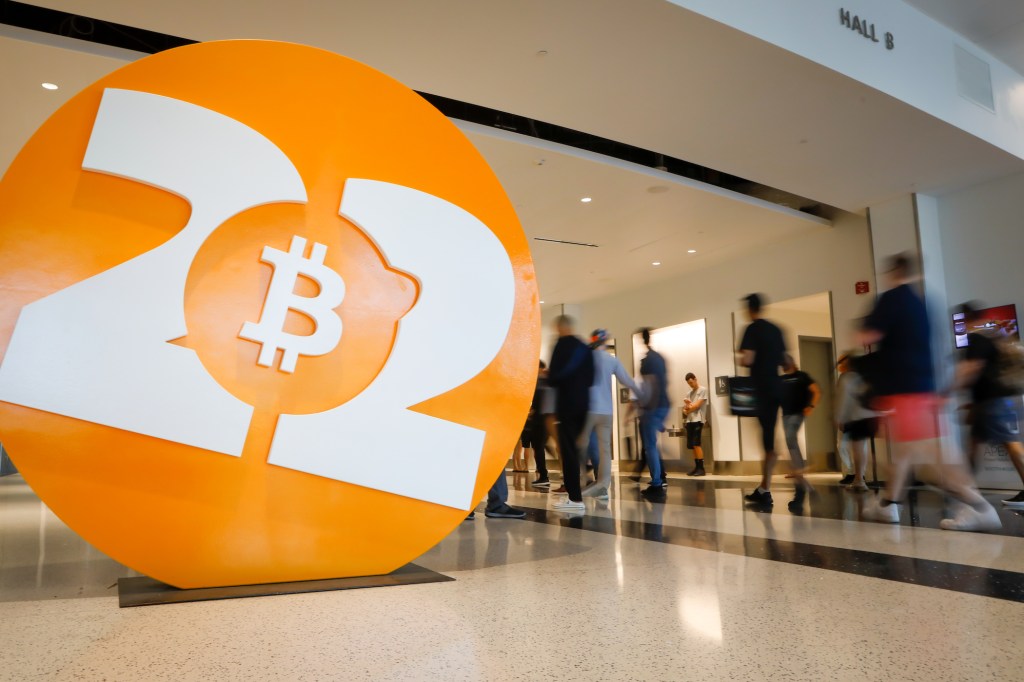This article is a writeup of the first episode of CRYPTOLAND, Motherboard’s documentary series about how cryptocurrency is affecting culture, politics, the environment, and our shared future. Watch it on Motherboard’s YouTube.
In late November, Motherboard went to DCentral Miami, an NFT and DeFi (decentralized finance) conference. The conference, which took place at the Miami Airport Conference Centre, featured NFT art galleries, digital fashion showcases, and a host of other crypto-centered events and experiences for event-goers.
Videos by VICE
“A lot of this is still abstract. It still reminds me of Bitcoin 2013,” Alec Liu, a former Motherboard writer who now works in the crypto industry, told us in the first episode of CRYPTOLAND, Motherboard’s new documentary series about how cryptocurrency has impacted our world. Back in, well, 2013, Liu and Motherboard went to Bitcoin 2013, one of the earliest Bitcoin conferences, where more than 1,200 Bitcoin advocates gathered to celebrate the fledgling cryptocurrency.
“It’s been a crazy, interesting, sort of weird scene. You feel like Bitcoin is entering a new phase,” Liu said at the time, covering the conference for Motherboard in footage recovered for CRYPTOLAND, which looks at how the industry and people within it have evolved over the past decade of crypto’s dizzying ascent, where now Bitcoin is an elder in a room packed full of screaming toddlers.
The 2013 conference was an early hub for all sorts of people and companies intimately connected to the crypto industry, including cryptocurrency exchange Kraken co-founder Jesse Powell, Ethereum co-founder Vitalkin Buterin, former Bitcoin developer Mike Hearn who was one of Bitcoin’s earliest users before declaring the entire project a failure in 2016. Even the Winklevoss twins—who that year had bought $11 million worth of Bitcoin and thereafter became evangelists—were keynote speakers.
Things have changed a lot since then. On the day of the Bitcoin 2013 conference, one bitcoin was priced at $123.22—this year its price has oscillated between $38,000 and $47,700.
“There were so many question marks everywhere, right, people were talking about this future but there was so much work to be done. You left kind of feeling like wow, this was Bitcoin’s coming out party,” Liu said.
“You have to realize: back in 2013, it was just Bitcoin,” Liu continued. “I would say the next big milestone was when Ethereum came out and now you could add programming and code—that sort of set the foundation for what we’re seeing today.”
The conference was put on by Charlie Shrem, co-founder of Winkelvoss-backed Bitcoin exchange BitInstant and the Bitcoin Foundation. BitInstant went defunct after Shrem was arrested in 2014 for facilitating a transfer of $1 million in Bitcoin that ended up on the Silk Road, a dark web marketplace taken down in 2013.
Today, Shrem is still a crypto-evangelist with a sense of humor about everything. In an interview with Motherboard, for example, Shrem gave his own unique theory about who Satoshi Nakomoto―the anonymous founder of Bitcoin―was.
“I think what makes Bitcoin great is that there is no Satoshi. Satoshi is probably aliens,” Shrem said. “Well, or time travelers. If time travelers invented Bitcoin to save the world, then they would release it in the way Satoshi released the white paper. Invent it and dip, go back, but not take any credit because you want the people believing it came from them. Or maybe the people invented it, I don’t know.”
Nonetheless, governments across the world are now figuring out how to handle cryptocurrencies as their consumer adoption and investor backing grow. President Biden signed an executive order this week calling on federal agencies to research crypto regulation as well as what it would take to make a U.S. digital currency. China has banned cryptocurrency mining, but China is also building its own digital yuan. El Salvador has embraced Bitcoin as legal tender.
“Everything is very, very early. People have gotten a taste of what’s possible and that’s why this energy, that’s why there’s this investment,” Liu told Motherboard. “We’ve seen enough validation to have the confidence that we’re going to get there.”
This episode of CRYPTOLAND also featured a panel discussion between Motherboard reporter Maxwell Strachan and Chief Strategy Officer of Coinshares Meltem Demirors, who talk about what has changed over the last decade.
“In the early days, when I got involved with Bitcoin it was not about an investment, it was not about making money, it was not about becoming a millionaire or a billionaire,” Demirors told the panel. “It was about how we use technology to subvert the current political, economic, and social climate. And to introduce a new thing to the world.”




